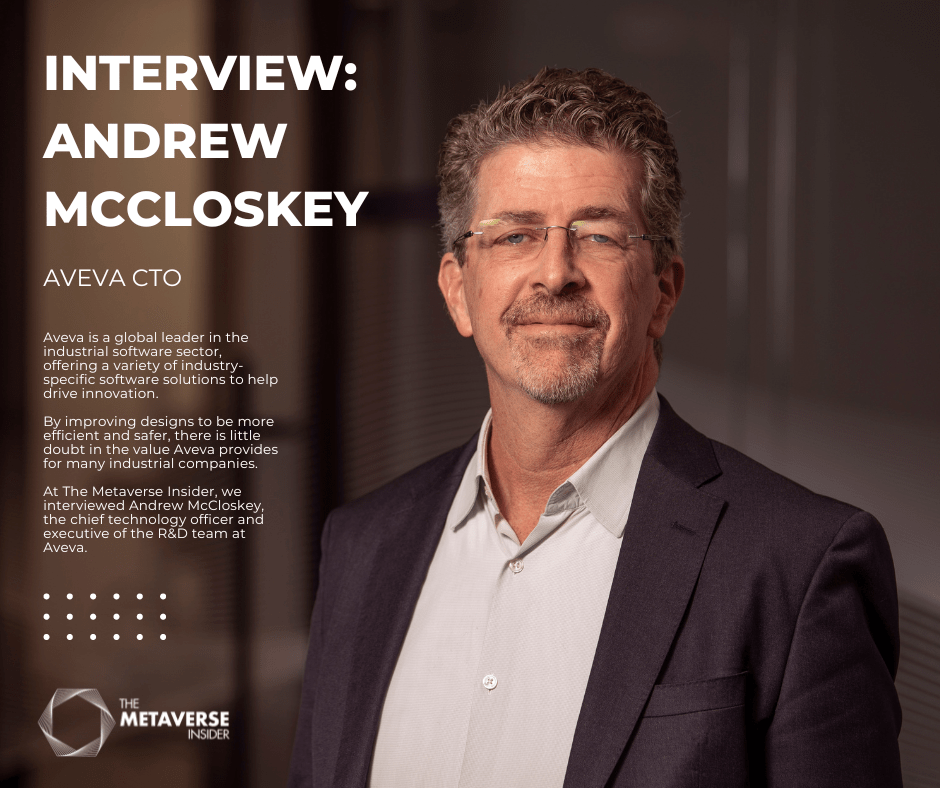Aveva is a global leader in the industrial software sector, offering a variety of industry-specific software solutions to help drive innovation. By improving designs to be more efficient and safer, there is little doubt in the value Aveva provides for many industrial companies.
At The Digital Twin Insider, we interviewed Andrew McCloskey, the chief technology officer and executive of the R&D team at Aveva. With companies beginning to utilize Web 3.0 tech and the Metaverse for improving business, Aveva is no different. There are many aspects to the Metaverse, however, Aveva is working on a concept that will forever change their industry – the industrial Metaverse.
Having been around for 55 years, Aveva is no stranger to pushing the limits of technology to help adopt new concepts. With Andrew leading a team of around 2,200 individuals in R&D, we can expect great things from the industrial Metaverse – effectively helping initiate the industrial Metaverse ‘revolution’.

From an R&D perspective, Aveva is not taking on a classic Metaverse approach like many commercial or entertainment companies; there is no need for VR shopping with highly customizable avatars. Andrew believes that there are three core components to the industrial Metaverse:
- The digital twin
- The data
- The experience
The first important aspect concerning the industrial Metaverse is the digital twin component. Considering Aveva’s expert understanding of industrial systems, they deeply understand the digital twin equivalent, and the specificity required:
“It’s not a cliche, it’s deep and different for each industry – and we know these industries: waste, water, chemicals, plants, etc. For example, a pump in some cases – you worry about cavitation. In other instances, you worry about the temperature of the fluid going through it. And with other pumps, it’s more about dialing just the right amount of pressure and not overdoing the set points. We understand deeply the digital twin and the specificity.”
The second aspect of the industrial Metaverse resides in the data. Aveva gets terabytes of data per day through its systems – thus, processing this presents a challenge:
“It’s more about actionable information that has infused AI. We get a lot of data, but how do you make that actionable, what’s important? What’s not important?”
Once you combine both the digital twin and the data – the experience comes into play. The experience is arguably the most important aspect of the industrial Metaverse; it should be incremental to what Aveva’s customers do today. As to be expected, not all Aveva customers will be gamers – therefore, its more about the efficiency of the experience:
“It isn’t all about the goggles, although we support the goggles. But we also say no, it’s going to be [experienced on] phones, tablets, and desktops.”
Andrew further alliterates Aveva’s underlying principles, emphasizing how “time is precious”:
“We need to make our time as efficient as possible, and the Earth is precious – in other words, we help our customers make it a better place”
Making the world a better place does not necessarily just mean reducing CO2 emissions from a plane or making wind and solar farms more efficient. Aveva goes deep into the science and math:
“For example, not many people understand what green steel is. Well, it’s creating steel from only hydrogen as an energy source. So, it’s completely free of CO2 emissions. We work with customers to do that as well.”
Efficiency and experience appear to be a keynote for Aveva, yet not at the expense of Earth – which is an ethos many of us would like to see throughout the industrial sector. What Aveva is doing is an evolution of what they have always done – simply in a more efficient manner.
Being in the top 3 for engineering and number one in HMI / SCADA (human-machine interface supervisory control and data acquisition) software, Aveva can truly make claim to having one of the most efficient companies on both the operational and data side of the digital twin. Through this, all individual assets can act as a system – where it is all brought together on their data cloud platform.
This will enable companies to use Aveva’s digital twins to be instantly transported to a facility. Either by utilizing a headset, your phone, or tablet, you can use the industrial Metaverse to visit any location, check on an issue, and fix it whilst being on the other side of the world:
“We have over 100,000 actual physical sites implementing our software, and these are the same customers that are going to go into the industrial Metaverse.”
Andrew specifies that with their technology, they do not want to own the industrial Metaverse – they want to create tool kits that allow companies to create their own Metaverses. This allows companies to protect their intellectual property – sharing their Metaverse sites once available… if they chose:
“It is all permissions based, and that is very difficult right now because all the technology is there, but it’s very difficult to use and piece together. We want to be the Apple in that sense of the industrial Metaverse.”
It is very clear that Andrew and his team at Aveva have a very prosperous evolution of both the industrial software sector and the Metaverse itself. By implementing this technology, it will be possible to fully operate facilities remotely – yet, as if you were actually there. This is a true leap forward in the capabilities of the Metaverse, and most definitely one of the most interesting applications of the Metaverse I have seen to date.
With so much emphasis on the entertainment side of the Metaverse, this is a remarkable eye-opener to the capacity and potential of what it can offer. This is truly the start of the industrial Metaverse revolution.
For more market insights, check out our latest Digital Twin news here.













